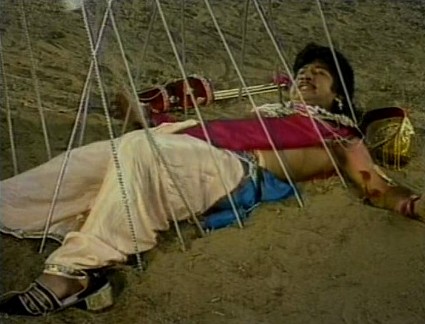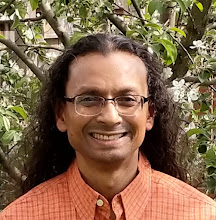
Over the next four years Devavrata demonstrated to the ministers and nobility that he was not only a powerful and brave warrior, but also an intelligent statesman and above all a kind and generous leader. Everyone in Hastinapura loved him and knew he would be a great king one day. Santanu couldn't have been more proud.
One day Devavrata noticed his father looking rather melancholy. He had seen his father like this before and knew it was because he was missing his wife Ganga (Devavrata's mother). Devavrata thought about suggesting to his father that he should remarry, but also knew that other women could not compare to Ganga in beauty and thus his father had no interest in them.
Usually his father would recover in a day or two, but this time an entire week went by with no improvement and Devavrata began to worry. Santanu hardly left his bed chamber so Devavrata went to see him there. "Father, for more than a week now you have not been attending to your kingly duties, and you have not even partaken in your favourite activity of horseback riding. Please tell me what is the matter so that I may try to find a cure?"
Santanu betrayed a guilty expression before regaining his composure and replying. "I've only been thinking about you my son, and am worried about your well-being. You practice the art of war with such dangerous weapons that I fear for your life. What am I to do if you are accidentally killed? What is the kingdom to do?"
Devavrata was shocked to hear this from his father, for previously his father had expressed nothing but pride for his prowess in battle. However, he did not question his father and instead simply answered, "I understand father," and took his leave.
Devavrata then immediately went to see the chief minister for information regarding his father's grief. The minister received him warmly, and upon Devavrata's query responded, "I too am worried about your father's depression, and I probably shouldn’t tell you this, but when your father and I were returning from Chedi we encountered a beautiful maiden that your father immediately proposed to..."
"And?" asked Devavrata eagerly.
"I don't know. They both seemed happy and joyous as if all of their dreams were about to come true. Santanu informed me that they were going to see her father for his blessings, and then after some time Santanu returned alone looking dejected and refused to speak a word about what transpired."
"Take me to them!"
After a couple hours of travel they arrived at the fisherman’s hut. They were warmly greeted by the fisherman and welcomed inside. Devavrata's attention was quickly drawn to Satyavati due to her scent and beautiful appearance, but there was something strangely familiar about her that he couldn't quite put his finger on.
Once seated, the fisherman then asked, "To what do I owe the honour of this visit?"
Devavrata replied, "I've become aware that my father, King Santanu, has asked for your daughter's hand in marriage. Is this correct?"
"Yes, that is correct", replied the fisherman carefully.
"Then why has she not returned with him to Hastinapura to be married?"
"When your father, King Santanu, came to me with the proposal, I noticed at the same time a change in my daughter and immediately knew she would receive many offers from many kings. So to be a good father, I needed to ensure that only the best offer was accepted."
"Ours is the wealthiest kingdom in the land. What is it that my father was unable to offer you?"
"I desire that my daughter's first born son be made heir to the throne."
Devavrata now knew the cause of his father's grief. He glanced at Satyavati again, and then it hit him She's half apsara just like me! For unbeknownst to Satyavati her mother was the apsara Adrika, who returned to heaven shortly after giving birth.
Devavrata now clearly recognized her unique apsara beauty that his mother also possessed, and when combined with the incredible allure of her scent, it was equally clear why his father was obsessed with her.
The fisherman would no doubt have his choice of kings to choose from. It would be virtually impossible to find someone comparable to Satyavati for his father. There was only one thing he could do.
"I, Devavrata, hereby renounce my position as crown prince and vow that the son born of this maiden," he indicated Satyavati, "shall be made king of Hastinapura."
The fisherman was pleased but was still not completely satisfied, for he had thought of another way by which his grandson may not acquire the throne, "I have no doubt you are a man of your word, but there is still the possibility your children might vie for the throne. How can you ensure that doesn’t happen?"
"I have already relinquished my right to the throne, and I shall now settle the matter of my children. O fisherman, with God as my witness, I hereby vow to remain celibate for my entire life!"
There was an ominous flash of lightning and thunder clap as Devavrata completed his vow. The fisherman was filled with delight and declared, "I hereby bestow my daughter to King Santanu of Hastinapura!"
Devavrata then turned to Satyavati and offered his hand saying, "Mother, please come with me to your new home."
Satyavati was in shock at the events of the evening, and the sacrifice Devavrata had made. Her initial happiness at the thought of marrying Santanu had now turned somewhat sour.
When they returned to the palace, Santanu was outside waiting for them. As Devavrata and the chief minister dismounted from the chariot, Santanu saw Satyavati was with them. He turned to Devavrata and asked, "Did you have to renounce your right to the throne?"
"Yes, father," replied Devavrata solemnly.
Santanu began to feel guilty for he knew he was responsible for his son making this sacrifice, but was ultimately happy that his wish to marry Satyavati had come true. He smiled at her and offered his hand for her to descend from the chariot, and upon feeling her soft hand, his desire began to build within.
Seeing that Devavrata had not given all of the details of his sacrifice, Satyavati then spoke with deep sadness. "Devavrata did not only renounce his right to the throne. My father also made him take a vow of celibacy to ensure that even his children could not vie for the throne."
"What!", shouted Santanu. "Is this true?!?" he asked Devavrata.
Devavrata kept his eyes on the ground and nodded. Santanu suddenly found himself overwhelmed with guilt and all of the lust he had, left him in that instant. "Why would you do such a thing?" pleaded Santanu.
"Because I love you father."
Tears poured from Santanu's eyes as he pulled his son into a tight hug and spoke, "Death shall never come to you for as long as you desire to live. Truly, death shall only approach one as pure as you after first obtaining your command."
Santanu then released his hug and continued while holding Devavrata's shoulders, "And for this terrible vow you have taken, you are no longer Devavrata. You are now Bhishma instead."
The next day, Santanu and Satyavati were married at the palace without any celebration at all.
Footnotes
1. Derived from: Adi Parva, Section C, p. 215-218.
2. Adrika: Adi Parva, Section LXIII, p. 126.























